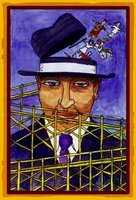Reflections on Self-Love, Self-Worth, and Family
The 15th Disability Blog Carnival will be on the theme of family and disability. Able-bodied or disabled, all children learn their value from the people with whom they spend time.
From listening to the childhood reflections of others and from my own childhood experiences, I see that the young child with a disability is like a sponge, absorbing and internalizing the feelings and actions of family and caregivers. I've put together a composite of some of these reflections.
If I’m a little child I feel love and consequently, value when:
My mother's eyes, voice, and face light up upon seeing me, rather than becoming dark, dreary, and sad.
Even if I'm not able to verbally respond, my aunt talks to me using my name, rather than about me with impersonal pronouns as though I'm not there.
My grandfather spends time with me, telling stories rather than letting me sit alone in front of the television.
My uncle casually helps me get my jacket on so we can go the park, rather than making a big fuss like I'm slowing everyone else down.
My brother listens to me when I say, "you're treating me like a baby," and responds, "you're right, I'm sorry," rather than laughing at me or ridiculing me.
My grandmother enthusiastically greets me when I come to her house, rather than complaining about the work she had to do to accommodate my needs.
My father cleans up my drool or my dirty diaper with matter-of-fact simplicity, rather than shaming me about bodily functions over which I have little control.
My caregiver seeks to understand me when I ask a question, rather than becoming annoyed with me.
My stepmother holds me with a strong yet gentle touch making me feel safe and secure, rather than with a tentative hold leaving me to feel both dirty and frightened.
My young cousins follow the example of my inclusive adult relatives, finding ways to have fun with me, rather than giving up without even trying.
My godmother learns some sign language so she can communicate with me directly, rather than relying on my parents to be intermediaries.
My parents’ longtime friend rejoices in the fact that I exist, rather than talking about what a burden I must be.
My parents correct a neighbor who laments the hardship a disabled child must bring to their lives, and articulate my value, rather than list my needs and their fears.
The child's view of himself or herself is shaped by everyday life experiences and interactions. If a child with a disability feels loved, self-love and self-worth will follow.










8 comments:
This one brought tears to my eyes. I wish every person with a family member with a disability would read this.
I echo Kathryn... It was truly a brilliant piece, it should automatically be handed out to new parents of disabled kids of all kinds.
I'm going to point to it in a blog post tonight, and add it to my public bookmarks.
Great post. Thank you for sharing.
There are so many ways your self esteem can be attacked. Thanks for sharing.
Self esteem is so important. I'll keep trying. Thank you
Thanks so much everyone.
Thanks, David, for an amazing blog. I find myself "grading" how I interact with my daughter based on your blog, looking for ways I could improve. I appreciate the help & the fresh perspective.
Oh wow, this is lovely. It brought tears to my eyes too, and I wasn't expecting that.
Post a Comment